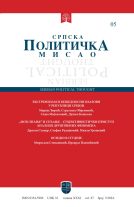- Home page
- Researchers
- Dr. Petar Matić
Dr. Petar Matić

- Address: /
- Email: petar.matic@lux-dog.com
- Telephone: /
- LinkedIn: /
Researcher
Institute for Political Studies
2000-
Teaching Assistant for the study course: Serbian political system
Faculty of Political Sciences, Belgrade University
2007-2016
Faculty of Political Sciences, Belgrade University
PhD
2016
Faculty of Political Sciences, Belgrade University
MA
2011
Faculty of Political Sciences, Belgrade University
BA
2000
Petar Matić, PhD, is the Research Associate at the Institute for Political Studies, head of the Center for Political System and State Administration and member of the Editorial Board of the journal Serbian Political Thought (English edition). Published a number of salient academic papers in the field of local self-government, regionalism and territorial policy, as well as direct democracy. Author of the books: “Izazovi i paradoksi globalizacije” (Challenges and Paradoxes of Globalisation) (co-authored by Aleksandra Mirović, Institute for Political Studies, 2007) and “Redizajniranje lokalne samouprave” (Redesigning of the Local Self-Governance) (Institute for Political Studies, 2012). Participated in several projects organised by the Centre for Free Elections and Democracy, OSCE and the Faculty of Political Sciences of the University in Belgrade. He is an alumni of Stanford University, Westminster University and the Council of Europe.

CITIZENS’ GROUPS AS LOCAL DEMOCRACY ACTORS IN SERBIA
The aim of this paper is to highlight the role citizens’ groups as democracy actors at the local level of governance. The author uses the statistical data analysis method and available findings related to the local elections’ results in Serbia between 1992 and 2022. In the introduction, the author identifies the main assumptions of local democracy as the basis of a broader, society-wide democratization. The importance of local self-government and elections for the lowest instance the vertical organization of power is also addressed. The paper points to the normative framework regulating the establishment and action of citizens’ groups on the political stage. In the central part of the paper, results of citizens’ groups are analyzed for each election cycle, along with their participation in coalitions and exercise of local authority. The conclusion seeks to answer the research question raised and to provide some recommendation for the empowerment of citizens’ groups as authentic local democracy actors.

Regional Separatisms and Independence Referendums in Europe
This paper explores the issue of regional separatisms and referendums on self-determination in Europe. These disintegration processes run counter to the ongoing universal trends of globalisation and global market creation. Although international legal documents define the self-determination as a right vested only in sovereign nations, aspirations of this kind are in practice increasingly exhibited by minority groups and nations. Furthermore, in some situations we are witnesses of double standards on self-determination, particularly remarkable in the case of Kosovo and Metohija. However, these disintegration processes are not confined to the states of the former Eastern Block, but are also present in the well-established and developed democracies boasting a broad spectrum of minority protection rights. These trends are particularly present in southern member-states of the EU, eroding its very foundations built on the idea of a united Europe as a multiethnic, multilingual and multicultural creation.

Aleksandra Mirovic, Essay on Civic Disobedience (Ogled o građanskoj neposlušnosti), Beograd: Službeni glasnik - Institut za političke studije, 2011.
Book review: Aleksandra Mirovic, Essay on Civic Disobedience (Ogled o građanskoj neposlušnosti), Beograd: Službeni glasnik - Institut za političke studije, 2011.
